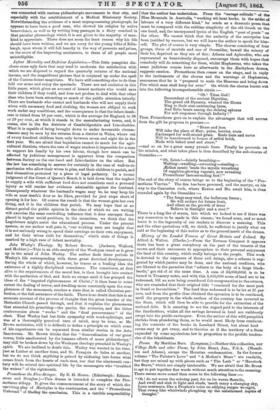Infant Mortality and Deficient Legislation.—This little pamphlet dis- closes some
ugly facts that may tend to moderate the satisfaction with which we are disposed to regard the quarterly returns of the national
income, and the magnificent picture that is conjured up under the spell of the Custom-house magicians. We have still something else to do than fold our arms and enjoy the spectacle. There are sad statistics in this little paper, whioh gives an account of honest mothers who would save their children if they could, and does not profess to deal with that other class who have been attracting so much of the public attention latterly.
There are husbands who cannot and husbands who will not supply their wives with necessary food and clothing, the women are obliged to seek work under any conditions, and the consequence is that the infant death- rate is raised from 18 per cent., which is the average for England, to 28 or 29 per cent., at which it stands in the manufacturing towns, and, it seems, also in the fen districts of Cambridgeshire and Lincolnshire.
What it is capable of being brought down to under favourable circum-
stances may be seen by the returns from a district in Wales, where out of every hundred children born only between seven and eight die in the
first year. We are afraid that legislation cannot do much for the agri- cultural districts, where the rate of wages renders it impossible for a man to support his family by his own labour, though how much can be effected by judicious management is apparent from the comparison between Surrey on the one hand and Lincolnshire on the other. But the law has something to answer for certainly in the case of well-to-do mechanics who allow their wives to pine, and their children to perish, and find themselves protected by a piece of legal pedantry. In a recent judgment of the Court of Queen's Bench it is laid down that the neglect to supply a wife with sufficient food does not constitute such a personal injury as will render her evidence admissible against the husband. Consequently whatever the husband's wages may be, he may keep his wife as near death's door as he likes, provided he just stops short of opening it for her. Of course the result is that the woman gets her own living, and it is the children that perish. We may hope that at no distant period the public opinion in the class of which we are writing will exercise the same controlling influence that it does amongst those placed in higher social position; in the meantime, we think that the Legislature might assist the educational process. Under the present system, as our author well puts it, "our working men are taught that it is not seriously wrong to spend their earnings on their own enjoyment, and let their wives shift for themselves," which state of things is marked by a high rate of infant mortality.






























 Previous page
Previous page